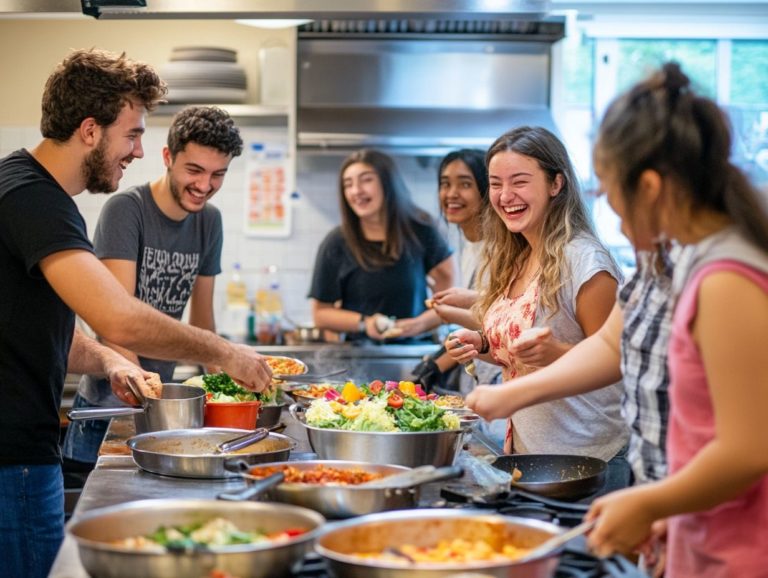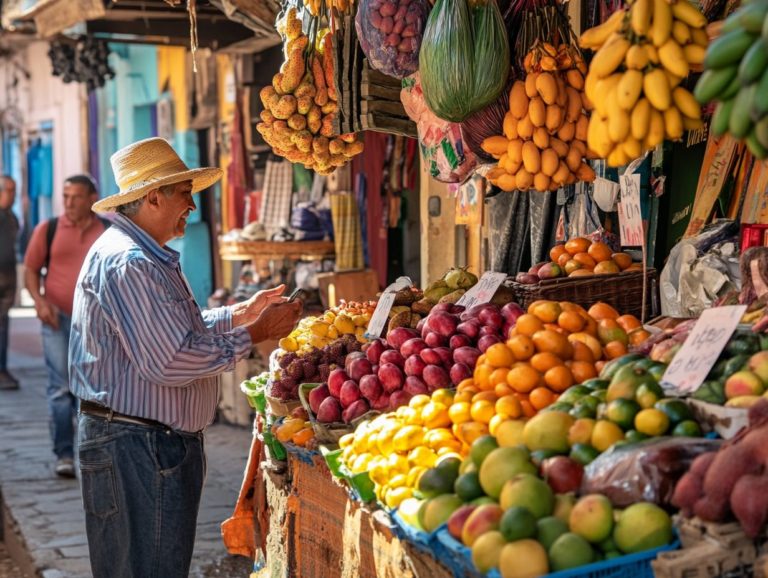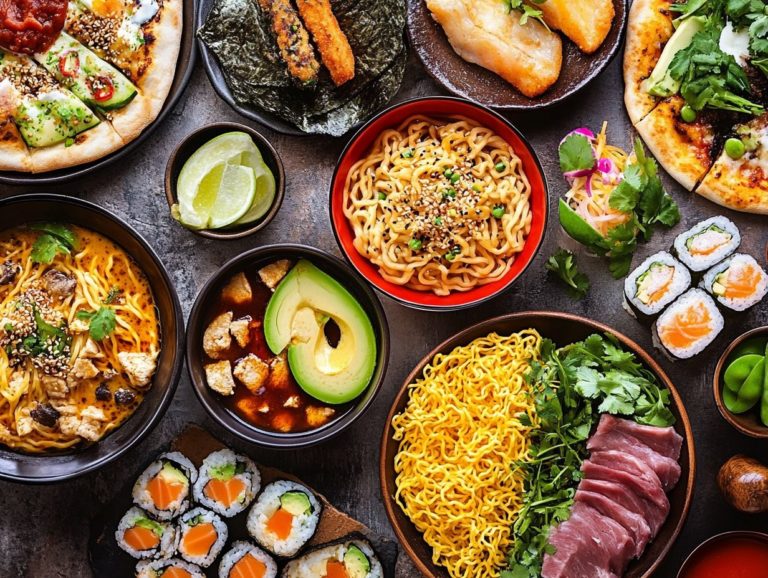5 Tips for Sustainable Eating While Traveling
Contents
- Key Takeaways:
- 1. Plan Ahead and Research Sustainable Options
- 2. Pack Your Own Reusable Utensils and Containers
- 3. Choose Local and Seasonal Foods
- 4. Support Sustainable Restaurants and Farmers Markets
- 5. Reduce Food Waste
- What Are the Benefits of Sustainable Eating While Traveling?
- How Can Sustainable Eating Help the Environment?
- What Are Some Challenges of Sustainable Eating While Traveling?
- How Can One Incorporate Sustainable Eating into Their Travel Plans?
- What Are Some Sustainable Eating Practices to Keep in Mind?
- How Can Sustainable Eating While Traveling Have a Positive Impact on Local Communities?
- Frequently Asked Questions
- What are the top 5 tips for sustainable eating while traveling?
- How can bringing your own reusable containers help with sustainable eating while traveling?
- Why is choosing local and seasonal food important for sustainable eating while traveling?
- What are some ways to reduce meat consumption while traveling for sustainable eating?
- How can travelers support sustainable restaurants while eating on the go?
- What should travelers do with their food waste to promote sustainable eating while traveling?
Key Takeaways:
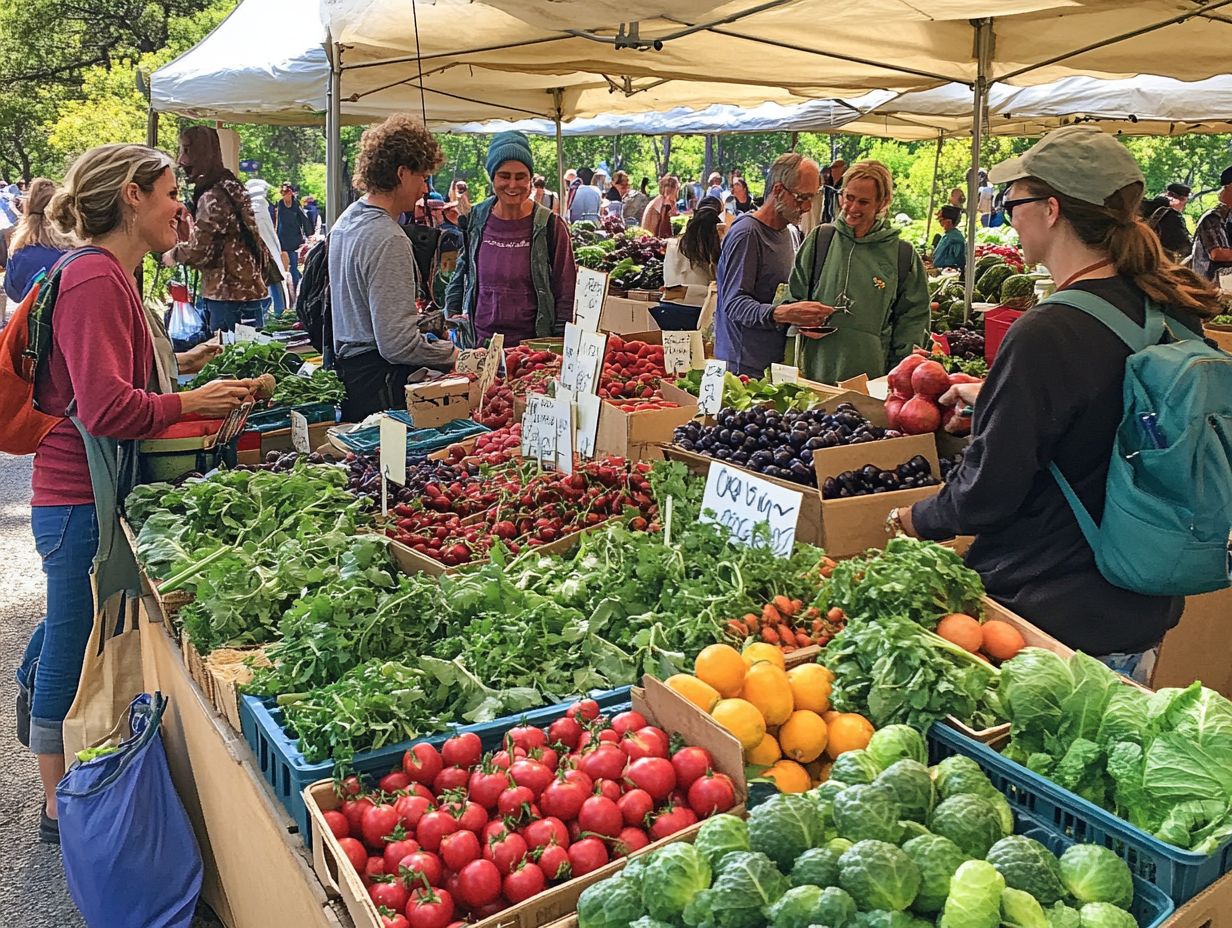
- Plan ahead and research eco-friendly options to support sustainable businesses and reduce your environmental impact.
- Pack your own reusable utensils and containers to minimize single-use plastic waste while traveling.
- Choose local and seasonal foods to support the local economy and lessen the environmental impact of your meals.
1. Plan Ahead and Research Sustainable Options
When planning your travels, explore eco-friendly options to enhance your food experience and minimize your environmental impact. By selecting eateries that prioritize eco-friendly practices and transparency, you empower yourself to make informed choices aligned with your values.
This proactive approach enhances your culinary adventures and supports local farmers and communities, creating a positive ripple effect throughout the food system.
Utilizing resources like local food markets allows you to discover fresh, seasonal ingredients, boosting local agricultural economies. Look for sustainable certifications that restaurants display, indicating their commitment to eco-friendly practices.
By researching eateries that focus on organic, farm-to-table options, you re not just enjoying meals; you re savoring the region’s true essence. Preparing in advance unlocks a world of delightful dining experiences while fostering a deeper connection to local cultures and supporting sustainability in the tourism industry.
2. Pack Your Own Reusable Utensils and Containers
Packing your own reusable utensils and containers is a simple yet impactful way to adopt eco-friendly practices while traveling, significantly reducing plastic waste during your meals.
These tools not only help lessen your environmental impact but can also save you money in the long run, allowing you to enjoy homemade meals wherever you go. Consider investing in durable and lightweight stainless steel or bamboo utensils, perfect for any travel adventure.
Choosing glass or silicone containers with secure lids keeps your meals fresh and prevents spills. When packing, opt for compact designs that nest neatly or have built-in storage solutions, ensuring easy transport without taking up too much space in your bag.
3. Choose Local and Seasonal Foods
Opting for local and seasonal foods enriches your culinary experience with genuine flavors while supporting local farmers and promoting sustainable sourcing.
Enjoying these fresh ingredients allows you to savor the true taste of produce picked at its peak. This practice not only lessens the environmental impact linked to transportation but also contributes to a healthier planet.
Supporting local agriculture nurtures the local economy and fosters community, allowing farmers to gain recognition and financial stability. It aligns beautifully with sustainable tourism efforts, as travelers seeking authentic experiences find joy in tasting the region’s unique flavors, deepening your connection to the places you visit.
What are your tips for staying organized while traveling? Share your experiences in the comments below!
4. Support Sustainable Restaurants and Farmers Markets
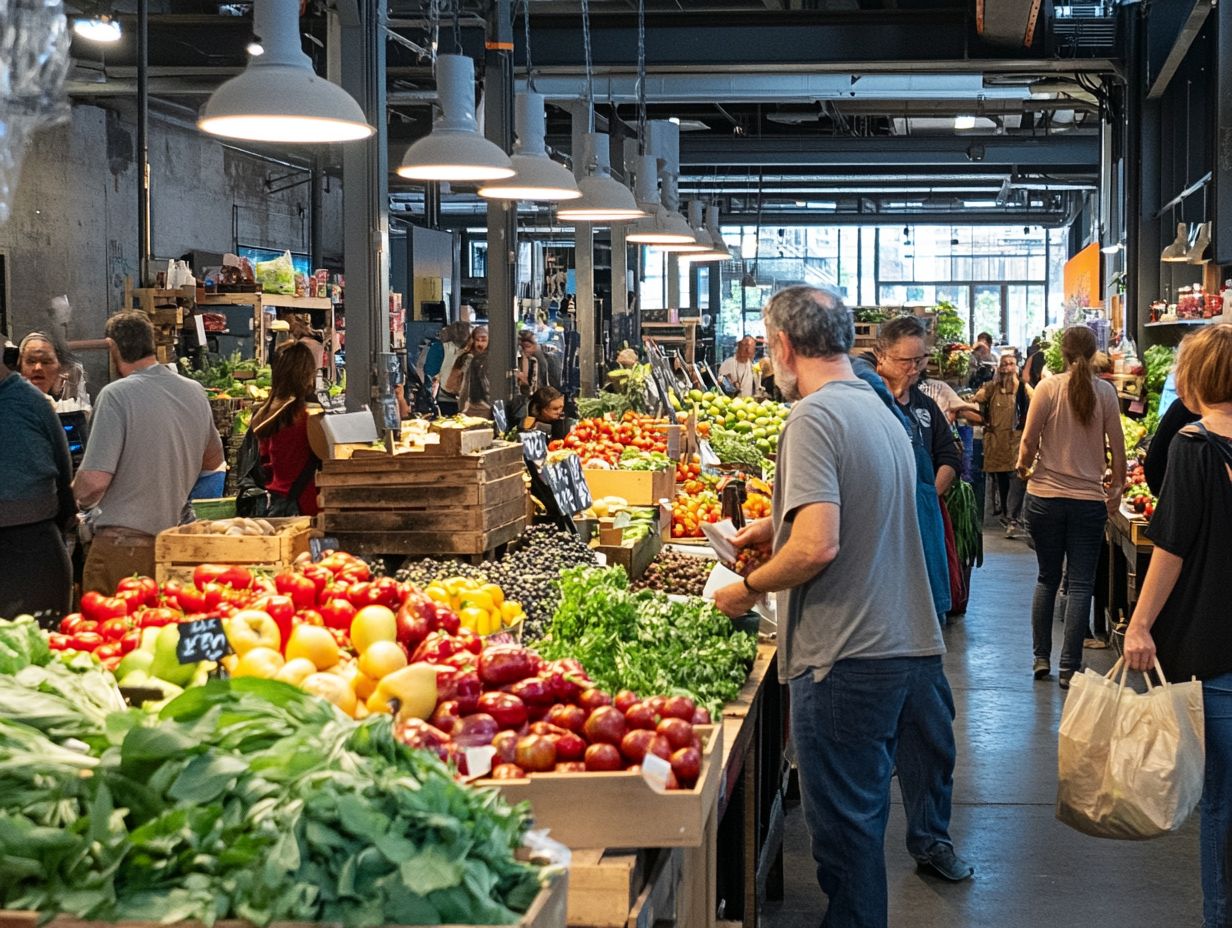
Supporting sustainable restaurants and local farmers markets is an exciting way to make a difference! These restaurants focus on local sourcing and seasonal ingredients. They also follow ethical practices.
Not only do these choices benefit the environment, but they also enhance your dining experience with fresher, more vibrant offerings. Certifications like Fair Trade and Marine Stewardship Council ensure that the ingredients you enjoy are ethically sourced, supporting fair wages and sustainable fishing practices. This commitment strengthens the local economy and resonates with your growing awareness of food ethics.
When you shop at local farmers markets, you gain access to high-quality produce while directly supporting farmers and small businesses in your community. This cultivates stronger ties and fosters a genuine sense of belonging, making every meal not just a feast, but a connection to your local roots.
5. Reduce Food Waste
Reducing food waste minimizes your environmental impact. Practice portion control to order what you can eat and enjoy mindful eating to appreciate local flavors.
Using leftovers not only combats waste but also invites you to discover creative ways to repurpose food. Whether transforming yesterday’s dinner into a breakfast or sharing it with fellow travelers, these strategies enrich your experiences and positively impact local food systems and economies.
What Are the Benefits of Sustainable Eating While Traveling?
Sustainable eating while traveling presents a wealth of benefits that elevate your experience. You gain enhanced health advantages from wholesome food options, reduce your carbon footprint, and cultivate a deeper sense of environmental responsibility aligned with local culinary traditions.
By selecting locally sourced ingredients and embracing traditional cooking methods, you not only support local economies but also enrich your understanding of diverse cultures. This mindful approach creates a meaningful connection to both the land and its people, transforming meals from mere sustenance into memorable experiences.
Moreover, these sustainable eating practices prioritize your well-being, leading to improved nutrition, increased energy levels, and overall better health. As culinary tourism continues to evolve, your commitment to these habits becomes crucial in promoting sustainable tourism, where the enjoyment of unique food experiences seamlessly harmonizes with environmental stewardship.
How Can Sustainable Eating Help the Environment?
Sustainable eating practices play a significant role in helping the environment by reducing the carbon footprint linked to food production and transportation, ultimately contributing to healthier food systems.
By choosing locally sourced and seasonal foods, you can cut down on emissions caused by long-distance shipping. Opting for plant-based meals decreases the demand for resource-intensive animal farming and helps reduce methane emissions.
Engaging in home gardening or supporting community gardens enhances local biodiversity, providing habitats for pollinators and other beneficial wildlife. Adopting methods like permaculture a farming method that works with nature to grow food sustainably and regenerative farming can restore soil health, ensuring nutrient-rich harvests. These eco-friendly food sourcing strategies not only offer nutritional advantages but also cultivate a deeper connection to the land and a strong commitment to environmental stewardship.
What Are Some Challenges of Sustainable Eating While Traveling?
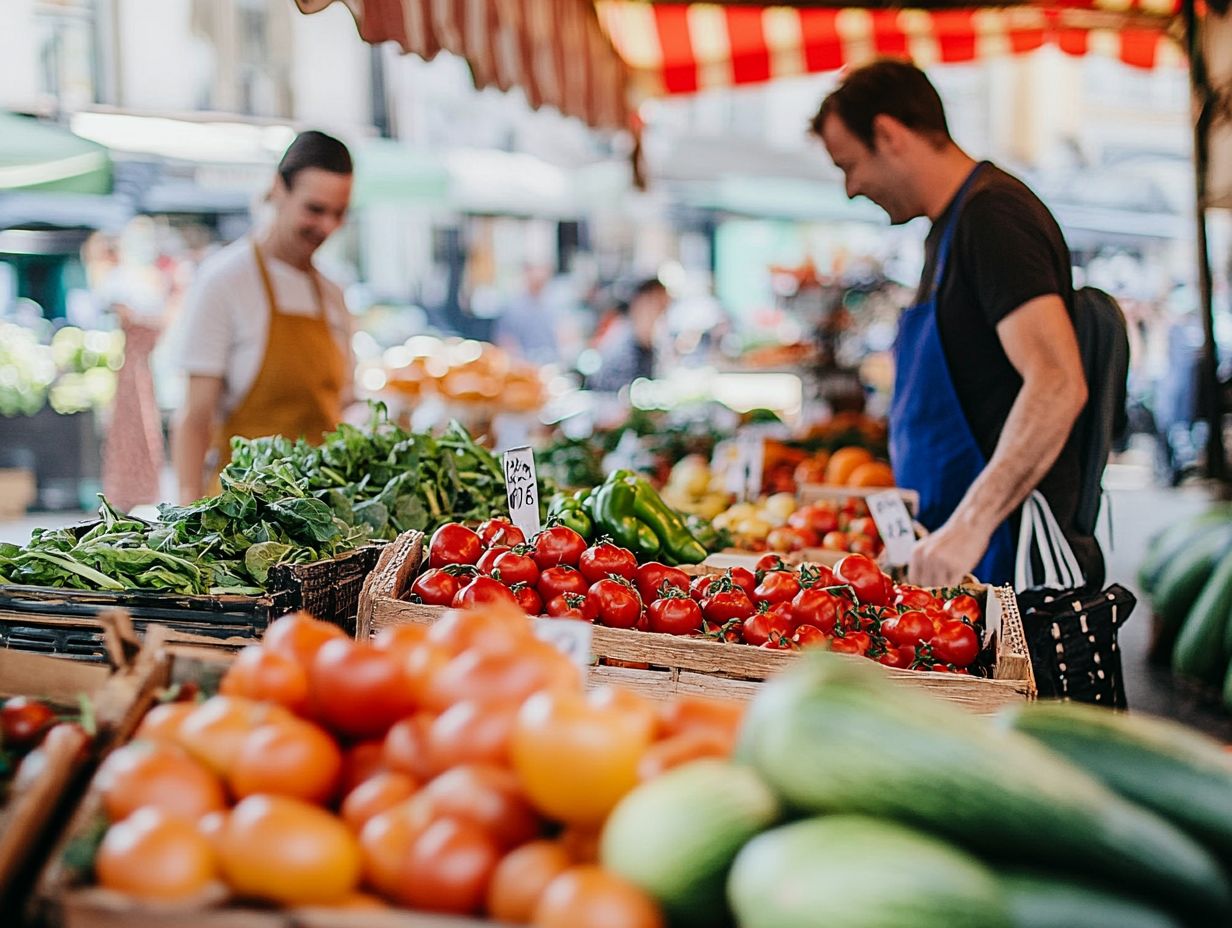
Sustainable eating has its perks, but it comes with challenges. You often face limited access to local ingredients, higher costs, and complex food transportation.
Finding organic produce can be difficult in areas with few local farms. Urban environments may have a vibrant range of international cuisine, but often lack fresh, local ingredients.
Food prices can make it hard to choose sustainable eateries, especially in regions plagued by food deserts. To overcome these obstacles, it s wise to plan ahead research local farmers’ markets or community-supported farming programs that can provide fresh, affordable options.
By embracing local cuisines that aren t commonly found elsewhere, you can elevate your culinary experience while supporting regional economies and reducing your carbon footprint.
How Can One Incorporate Sustainable Eating into Their Travel Plans?
Incorporating sustainable eating into your travel plans can significantly enhance your experience by focusing on dining options that celebrate local markets, seasonal produce, and eco-friendly practices.
By taking the initiative to research the local cuisine before you arrive, you can uncover hidden culinary gems that highlight the region’s rich heritage. Engaging with farm-to-table restaurants not only supports local farmers but also offers you a delightful and authentic taste of the area.
Exploring local markets presents the perfect opportunity to select fresh ingredients that reflect seasonal offerings. You might even find yourself engaging with vendors to learn about their production methods. This hands-on approach to eating delights your taste buds and connects you to the vibrant culture of your destination.
What Are Some Sustainable Eating Practices to Keep in Mind?
Adopting sustainable eating practices, like diving into cooking classes or exploring vibrant food markets, can make your culinary journey exciting and fulfilling.
By immersing yourself in these enriching experiences, you open the door to learning about mindful consumption and uncovering the richness of local culinary traditions. This hands-on approach gives you the power to make informed choices that favor plant-based diets, focusing on ingredients that are both seasonal and sustainably sourced.
Engaging with local farmers deepens your understanding of the food system, nurturing a meaningful connection to the land and its resources. Ultimately, embracing these practices not only enhances your personal health but also contributes to the well-being of our planet, highlighting the collective impact of conscious choices.
How Can Sustainable Eating While Traveling Have a Positive Impact on Local Communities?
Sustainable eating while traveling not only enriches your experience but also positively impacts local communities by supporting local farmers and fostering community engagement.
When you prioritize local produce and regional specialties, you re not just satisfying your palate; you re actively contributing to the economy by creating demand for small-scale agricultural endeavors. This choice establishes a direct link between you and the growers, boosting revenue for local farms and businesses.
By aligning your culinary preferences with sustainable practices, you play a vital role in cultivating a vibrant local food system. Your informed decisions help preserve community heritage, encourage biodiversity, and promote fair labor practices.
This interconnectedness ultimately enhances community resilience, ensuring that local economies flourish while safeguarding the environment for future generations.
Frequently Asked Questions
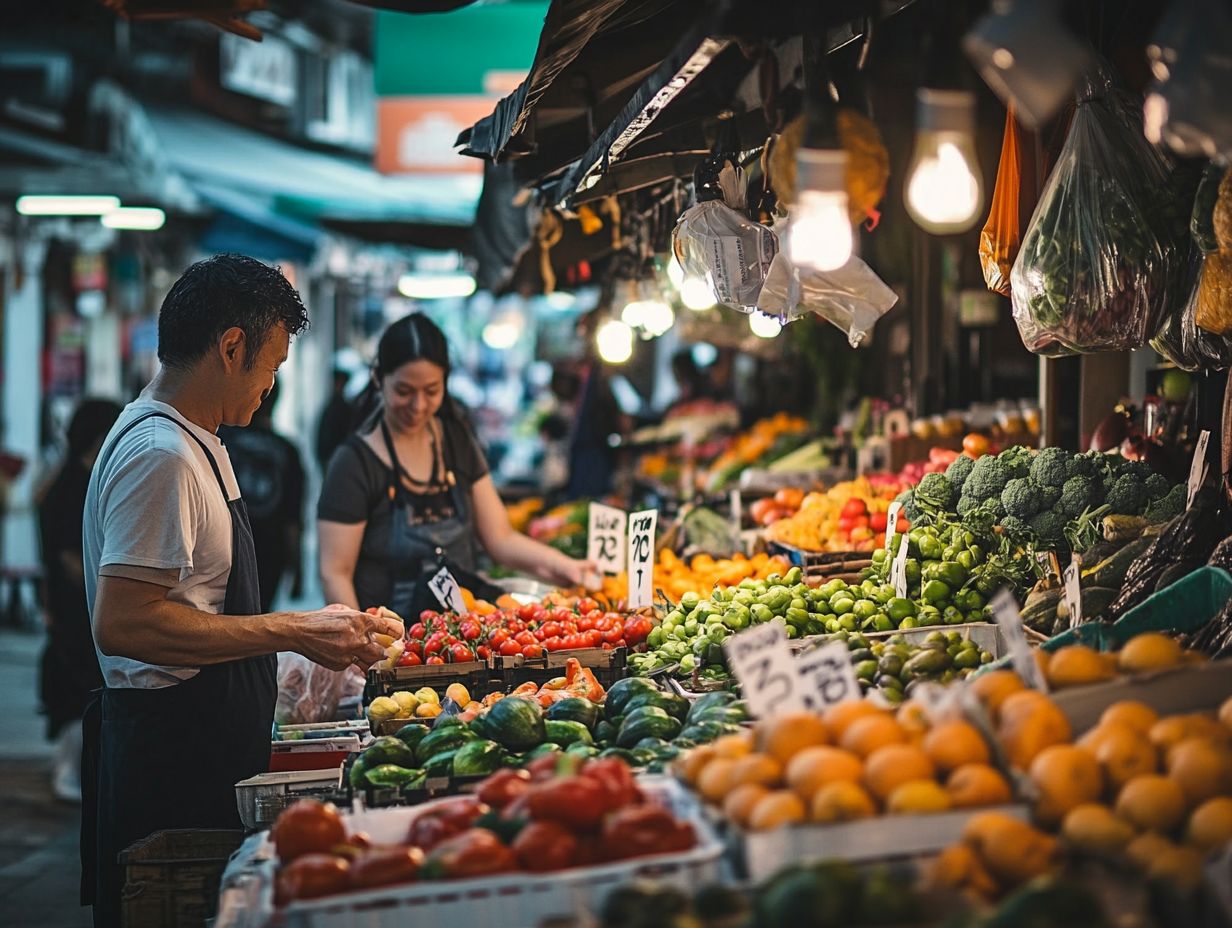
What are the top 5 tips for sustainable eating while traveling?
Here are five tips for sustainable eating while traveling: bring your own reusable containers, choose local and seasonal food options, reduce meat consumption, support sustainable restaurants, and properly dispose of food waste. For more insights, check out these tips for sustainable travel as a student.
How can bringing your own reusable containers help with sustainable eating while traveling?
Bringing reusable containers cuts down on single-use plastic waste. Use them to pack meals or store leftovers instead of relying on disposable packaging.
Why is choosing local and seasonal food important for sustainable eating while traveling?
Choosing local and seasonal food supports the local economy and lowers the carbon footprint of your meals. Plus, it means you’re eating fresher, more nutritious food that hasn’t traveled far.
What are some ways to reduce meat consumption while traveling for sustainable eating?
Try vegetarian or vegan options, choose sustainable seafood, or include more plant-based meals in your travel diet. These choices make a big difference for the environment.
How can travelers support sustainable restaurants while eating on the go?
Support sustainable restaurants by researching options before your trip. Look for places that focus on local ingredients, reduce food waste, and practice eco-friendly measures.
What should travelers do with their food waste to promote sustainable eating while traveling?
To promote sustainable eating, dispose of food waste properly. Compost when possible, use designated food waste bins, and be mindful of your portion sizes to prevent excess waste.

